Once my treatment is over, she said, I shall live each day as my last.
Not ‘as if’ but ‘as’: there’s a difference in emphasis I can’t quite put my finger on – something about actually doing it rather than pretending, perhaps?
It’s not an original thought, I know, but it’s set me thinking – about what our last days might look like, at best but also at the worst; how terrible it might be to be caught up in vengeful wrangling or bitter recriminations or in replaying old slights or newer sufferings and suddenly to find that this was how life would end for you. Or even if death took you unaware of how your final moments had been spent – I feel sure that dying with your focus on spite or sorrow will colour the process. It’s a bit like the old warning ‘Be careful the wind doesn’t change’ when your face is set in a grim expression for fear it might stick like that: to die with bad feelings uppermost will surely, somehow, make for a bad death. Not much better would be an indifferent ending – merely a fizzling out or Eliot’s famous ‘whimper’ – after a day frittered away. Not that I’m advocating anything so easy as looking on the bright side. Nor am I suggesting we follow the advice of another friend who recommends not allowing yourself to get up in a morning before you have managed at least one smile. Rather, I am interested in the choices I might make if I knew that this day would be my last, but without forewarning; that is, without the chance to tick off the item at the top of my bucket list, with no possibility of arranging to visit a favourite place or a longed-for destination, or to meet that special person one last time.
Something I heard somewhere recently – the source escapes me now but it has cropped up in conversations since – was the idea that we might take care to notice – one thing, anything, but really notice it, rather than going about our day with our heads down, just getting on with whatever we’re doing, with only the most superficial attention on what's around us. I’m reminded of a project initiated by Francesca in Buenos Aires: that each day we would walk just one block observing – in particular looking up at the upper floors of the buildings, often more elaborate or curious or enchanting than their ground level would lead you to assume. So yesterday, walking along the river, I saw how the clouds were stacked pale behind the spire of the church at the far side of the Common (after 12 years living in Cambridge, I had to check the name of the church (All Saints) when I arrived home). And I saw how sunlight alters everything. And listened to the birdsong behind the magpies’ chatter, ubiquitous now.
The pleasures and benefits of being outside have become highlighted during lockdown and this would be something I would add to my ‘last day’ list: whatever the weather, to spend at least a few moments outside. And, separately or not, exercise – not to let a day go by without some physical activity. Also I’m adding dancing to my list: not tango, probably, but for at least one song to get in touch with how my body might respond to music – something I’ve neglected for years, to the point where I’m actually unable to get to my feet and dance in any social gathering. That’s a loss I can recoup.
What else? Writing, of course; too often recently I’ve avoided the moment where I sit down with a blank page in front of me, blaming the fact that I have nothing to write. There is always something; even one sentence
To contact another human being should also be there: too many opportunities wasted, too often ready to crawl into my shell and leave it to others to contact me.
And finally – is it? – to do one small selfless thing each day that will benefit someone else – either small scale or for the ‘greater good’. That last sounds horribly self-righteous! And I’m wondering if there could be two separate impulses here: one personal, the other on the macro level..?
Saturday: not sure that I’ve hit either target in the last paragraph today but saw the blaze of virginia creeper on the Ferry Path bridge this morning and squeezed in an eleventh hour (literally) stumble around to Nina ‘Feeling Good’. And this I guess is/are my sentence or two: in sum, I’m inspired to be fully in the present; to inhabit the moment; to squeeze every ounce of nourishment from the day…
Bed. Yorkshire tomorrow.
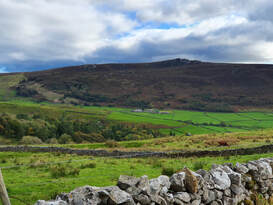
The way stone walls follow the curve of the land, the tree line, the valley bottom, divide field from field - the way beads of sheep’s wool are strung along a low fence wire - the way the cottage is hidden from the Darnbrook road behind trees - the way the trees are edging into autumn with an occasional one ahead of the crowd already a fire - the way after a certain time the noisy crows fall silent - the way the road drops dizzyingly down - after we left the motorway, the way one field after another was lit up emerald - the way the usually quiet roads were crowded with cars and walkers, even in the village - the way after sundown quiet was restored! - the way my feet stuck to the surface of the road, the way my breath stuck in my lungs, too long unused - the way turning and heading downhill was something of a relief! - the way I’ve mourned the loss of my ability to write as if it was for ever - the way the words spill across the page...
Fall No. 1: backwards into a ditch at the roadside - no damage.
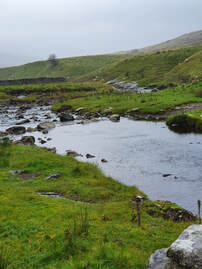
...the way fields sweep down into the valley - the way in Wharfedale the valley bottom opens flat and wide, clumps of trees clustered along the slopes on the opposite side of the river - the way the trees are beginning to revel in colour, one or two massive chestnuts and sycamores ablaze with shades of orange and burnt umber, gold and magenta - the way the trees! - the way the larches by the river at Hawkswick lift up their skirts insolently, provocative, beginning the turn to ochre - the way the skeleton of a tree cavorts crazily, all limbs and angles - the way woodsmoke winds into the evening with the memory of a Burgundy November - the way the dipper appears suddenly and splashes and dips and swims before as suddenly flying off, skimming the surface of the water - the way the morning is constant drizzle, cloud hanging low between the hills - the way the garden birds vie for priority; so far the nuthatch is in charge...
… the way the cloud sits on the hills as we drive into Wensleydale, rolling in around us, shrinking visibility to almost nothing - the way the cashier in the Spar launches into their Covid history, blaming Polish workers at the cheese factory for the earlier outbreak there - the way the rain sets in steadily as we take the track towards Nethergill Farm, passing the house where once we saw a man standing at the window - the way I can’t wait for the stove to be lit...
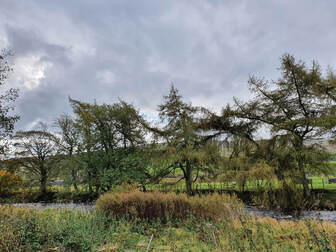
WEDNESDAY
...the way grass is combed thin across the rocks beneath - the way the cliffs across the valley are grooved like sabre-teeth or stalactites - the way the landscape is never still - the way two jackdaws sit in parallel on adjacent fence posts, and four ducks fly diagonally past, followed by another four, both in pairs - the way the call of crows is a rasp and the chorus of gulls as they rise and wheel above a far field is plaintive and shrill - the way pewter rain cloud drifts over the hill from Kettlewell and just hangs there, waiting - the way a swatch of pale blue behind a higher bank of sunlit clouds remains above the hills to the south - the way the steep slopes this side of the valley are ghosted with the pale outlines of what I think are dead or dying ash, their bare branches silver-grey against the green - the way there seem to be several stands of newly-planted saplings amongst the skeletal forms - the way the mossy walls glow emerald darkening to green-black with odd patches of faded crimson and occasional spots of deep vivid pink - the way there are sudden patches of paler green where tiny ferns grow out of the lichen - the way hips dot the roadside scarlet - the way the first larches of Hawkswick come into view - the way heading back towards Arncliffe the church tower is visible amongst the trees - the way the sky ahead clears into a hard blue - the way the sun, warm on my face, glistens through still-wet leaves - the way, whilst I have been out, our log basket has been replenished…
.. the way the grey stone walls are every shade of grey, lightening to white patches of lichen and also sand and russet - the way the white horse in the blue coat twitches his ears for the camera - the way the lives of the lead miners of Grassington remind me of the gold prospectors in The Luminaries: hard lives - the way Grass Wood spreads, a rich mix, either side of the Conistone road, dropping steeply down to the river - the way the evening light! - the way a lone magpie flies like an arrow across the full length of a field - the way a small owl stands transfixed in the headlights, crouching over roadkill, before turning and flying off...
...the way the world can turn on a sixpence - the way in the blink of an eye everything has changed.
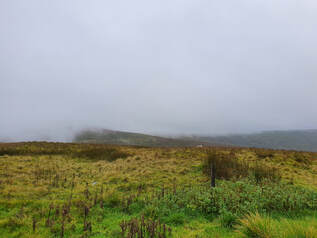
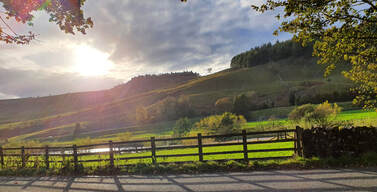
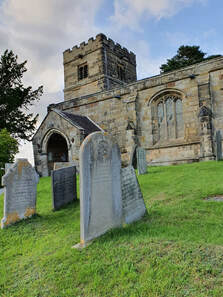
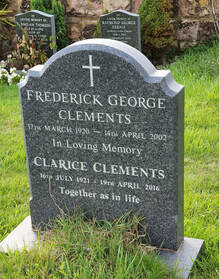
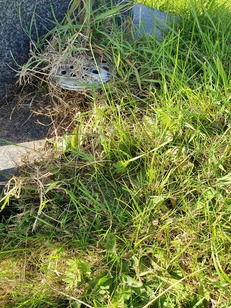
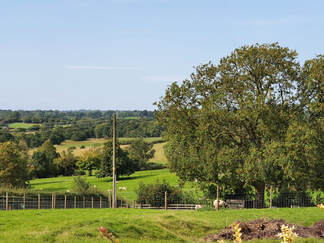
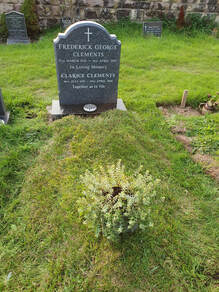
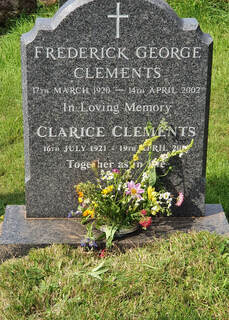
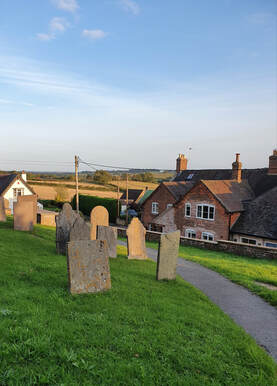
 RSS Feed
RSS Feed
